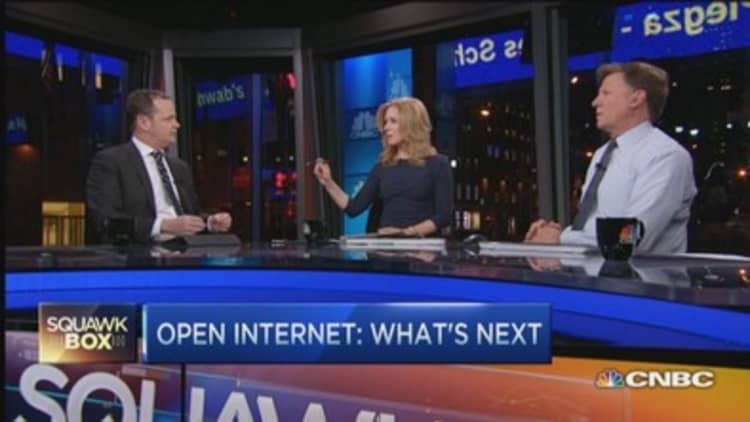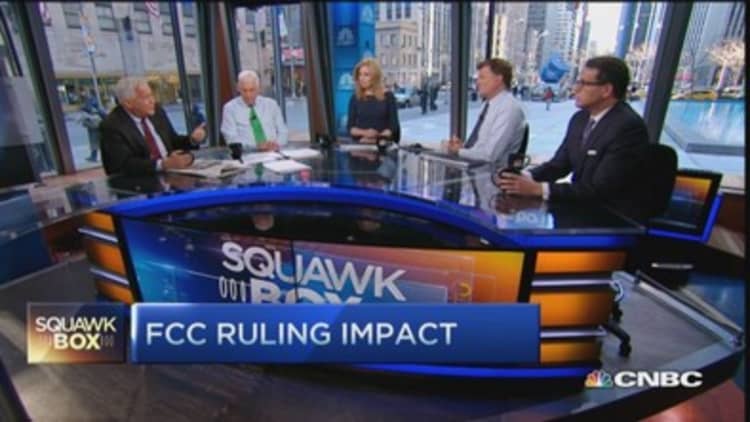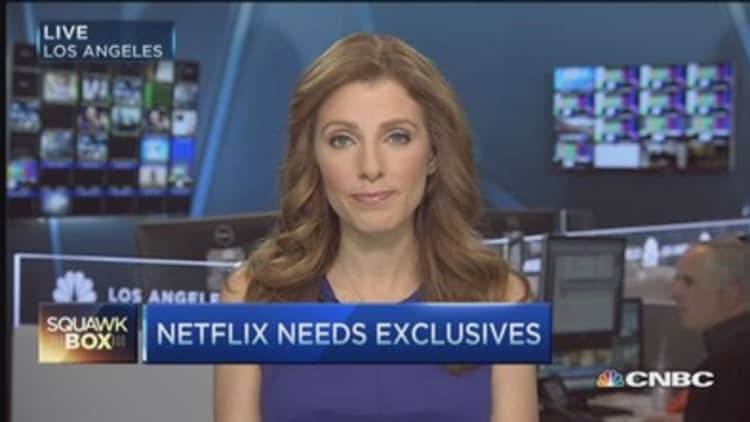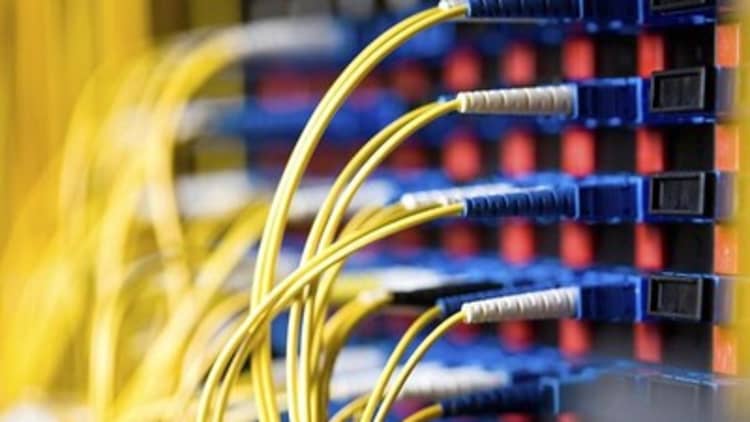


The FCC's adoption of net neutrality regulations might actually pave the way for the completion of the proposed megamerger of Comcast and Time Warner Cable, analyst Daniel Ernst told CNBC on Friday.
"If your fear of a larger, bigger, badder Comcast is that we can't regulate them, now we have regulation. So there's no legal reason to withhold the merger," the equity analyst at Hudson Square Research said in a "Squawk Box" interview.
While one could argue the existence of a regulatory backstop makes it easier for the Justice Department to approve the deal, one could also take the FCC vote as emblematic of a negative environment for cable and broadband provider, said Craig Moffett, partner at research company MoffettNathanson.
"Either of those is as convincing as the other. I tend to come out a little bit more on the side of the latter, and that's why we lowered the probabilities because you can see the political winds are blowing in the face of this deal," Moffett told "Squawk Box."
Moffett puts the chances of the deal going through at 60-40, down from 80-20.
As expected Thursday, the FCC voted 3-2 along party lines to adopt the Obama administration's plan to regulate Internet providers under Title II of the 1934 Communications Act.
Read MoreFCC votes to classify Internet as a public utility
Net neutrality is the policy of treating all Internet traffic equally, rather than blocking or imposing "tolls" on access to faster service.
Enshrining net neutrality in FCC rules gives the agency the ability to regulate the providers like telephone line operators. Among other things, the FCC will be able to prevent providers from blocking legal websites, slowing down traffic to specific sites or allowing faster access to other services, such as Netflix or Amazon Instant Video.
After all the debate over net neutrality, the vote to regulate service providers in accordance with the open Internet policy changes very little, according to Ernst
"I don't think anything changes," he said, noting that Comcast agreed to abide by the principles of net neutrality when it purchased CNBC-parent NBCUniversal.

Telecommunications and cable companies are unlikely to spend less on infrastructure investment, Ernst said. He noted that the companies spent $44 billion to acquire new wireless spectrum during an FCC auction in January.
"They wrote that check full knowing that this was coming," he said.
Read More Cuban on net neutrality: It will be whac-a-mole
The outcome is a "shot in the arm" for the technology sector because it blocks service providers from charging companies to reach customers more quickly through so-called "fast lane" connections, David Garrity, founder of GVA Research, told "Squawk Box."
"That obviously benefits not only the established players on that side of the business, but potentially also a lot of the venture capital and start-up activity that is going to rely on the Internet," said Garrity, an advisory board member for a late-stage venture capital start-up co-investment fund.
Net neutrality proponents claim differential pricing will make it harder for new companies to compete with large tech firms, who could pay for access to fast lanes and therefore offer a better user experience.
Because the FCC will not enforce a Title II provision that allows it to regulate the cost of service, the vote does not control the sector as much as some people have feared, Garrity said. Critics say bureaucrats could later decide to impose that part of Title II on Internet service providers.
Read MoreNet neutrality will slow investments: Sununu
Given the ratio of Democrats to Republicans among the commissioners, the fact that the issue is somewhat politicized should not be a shock, Walter Isaacson, president and CEO of the Aspen Institute, told CNBC. The best way to enforce net neutrality would have been through the political process, he added.
Sen. John Thune, R-S.D., indicated earlier this week congressional Republicans would not seek a legislative solution to the issue as previously planned, saying Democratic support for FCC regulation had made it all but certain a vote on Capitol Hill would fail.
In the absence of such a vote, Isaacson said, it's a plus that the FCC took measures to prevent cable and telecoms companies from deciding how Internet is delivered to American homes, noting that there's little competition in the industry. A recent FCC study estimates that 75 percent of Americans don't have a choice of Internet service providers.
Ernst said the political aspect of the vote gives him pause.
"The fact that actually Obama did influence the shift to Title II makes you say, "Well OK, does he actually have influence over the [Department of Justice]? If he wants to block this, is it possible?'" Ernst said, referring to the widely anticipated legal challenges to the FCC's decision.
In November, President Barack Obama urged the FCC to adopt stronger rules based on net neutrality.
Read MoreObama flip-flops on FCC transparency: Chaffetz
Some who opposed applying Title II to Internet service providers have said Obama influenced the FCC, whose chairman, Tom Wheeler, is appointed by the president, though the agency is supposed to function independently.
Ernst speculated that a future Republican-dominated FCC could overturn Thursday's decision.
After the new rules are entered into the Federal Register, a process that will take about two months, they will immediately face legal challenges from service carriers seeking to overturn the Title II classification, Moffett said. Opponents will also sue on the grounds that the FCC cannot hold back on enforcing price regulation, he said.
While the suits will take years to work their way through the courts, Moffett believes the rules will ultimately stand. The reason: The courts will defer to the FCC as the most qualified agency to classify Internet service delivery. The precedent is known as "Chevron deference," named for a similar ruling on the EPA's regulation of the energy industry.


